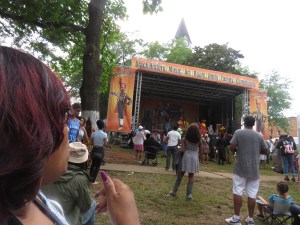2017 Juneteenth Atlanta Parade & Music Festival
GME is a strong supporter of Juneteenth Atlanta Parade & Music Festival!!!!!!


On June 16-18, 2017 the Juneteenth Atlanta Parade & Music Festival held on the campus of The Historic Morris Brown College was a time of celebration, love, unity, economic empowerment, entertainment and education. The event highlights local musicians, dancers, educators and various forms of artistic expression. There where vendors from every aspect of culture; food, healing, education, household products and representative from various community organizations.

The Juneteenth Parade is a highlight of this celebration. The fact that the parade is on MLK drive adds historical value to the event. This is an example of developing the “Beloved Community” Dr. King spoke of. The Juneteenth Atlanta Parade is a mechanism to display triumphant brilliance of Black History, International African Diaspora History and Present Contributions. It is a time for children to learn, family to unite and individuals/organizations to display their goods/services. In addition to the historical perspective, the parade is also a form of economic empowerment in that businesses on MLK drive will have over 1,000 people walking by their establishment and businesses/organizations can promote their enterprise by purchasing a float to parade their work down MLK drive.
Juneteenth Atlanta Parade & Music Festival is a clarion call to unite Afro-Atlanta. There are 4 main areas GME targets to help Juneteenth Atlanta; 1. Churches 2. Politicians 3. Businesses 4. Schools. As the city that gave birth to Dr. Martin L. King, Jr., that is home to (The AUC) Morehouse College – Clark Atlanta University – Spelman College – Morris Brown College, that is home to many of the current leaders in the music industry, in particular relation to current events of violence, poverty, illiteracy rates, disease rates amongst the African-American community, it is high time for the African-American community to organize & mobilize herself into a sustainable model of well-being.

This event is an event that all African- Americans have in common as direct descendants of enslaved Africans in America. As well as for other non African-Americans to learn of the contributions African-Americans made to culture & civilization. In addition, the $billion Mercedes Benz Stadium creates a sense of urgency for Afro-Atlanta to ensure The Historically Black Westside Village (English Avenue, Vine City, Ashview Heights, Washington Park and the Atlanta University Center.) organizes themselves in proper manner to participate in the coming prosperity to what is now being called “The New Westside”

For the Juneteenth Atlanta Parade & Music Festival, Groove Master Enterprise (GME) works to help plan, promote and present the event in coordination with other individuals and organizations. One piece we at GME look forward to presenting next year is the Junteenth Atlanta Music Scholarship fair. The GME goal is to establish a School-2-College Pipeline through Music Education.
Brief History of Juneteenth
Juneteenth is the best-known and one of the oldest American holidays that celebrates the end of slavery in the United States; it commemorates the date June 19, 1865, when the last African American slaves held in Confederate states were freed and has been observed since June 19, 1866.

Although President Abraham Lincoln issued the Emancipation Proclamation as an executive order on January 1, 1863, its immediate impact was relatively small due to the fact that Confederate slaveowners weren’t compelled to observe Union authority. Thus, millions of African Americans continued to live as slaves until Union armies gradually made their way across the South to overtake Confederate resistance and enforce Lincoln’s order.
On June 19, 1865, approximately two-and-a-half years after Lincoln signed the Emancipation Proclamation, Union Army general Gordon Granger accompanied with 2,000 federal troops arrived in Galveston, Texas, took possession of the state and stood on the steps of Ashton Villa and read General Order #3, announcing that all enslaved African still being held in the state of Texas were legally free. Six months later, the passage of the Thirteenth Amendment in December 1865 would ultimately make slavery illegal throughout the entire United States.